5 books about Jeremy Bentham
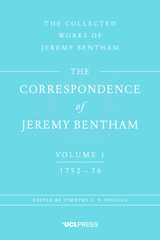
Correspondence of Jeremy Bentham, Volume 1
1752 to 1776
Jeremy Bentham, edited by Timothy L. S. Sprigge, and series edited by J.H. Burns
University College London, 2017
The first five volumes of the Correspondence of Jeremy Bentham contain more than 1,300 letters written to and from Bentham over fifty years, beginning in 1752 at the age of three and ending in 1797 with correspondence concerning his attempts to set up a national plan for the provision of poor relief. The letters in Volume 1 (1752-1776) document his difficult relationship with his father—Bentham lost five infant siblings and his mother—and his increasing attachment to his surviving brother, Samuel. We also see an early glimpse of Bentham’s education, as he committed himself to philosophy and legal reform. The exchanges in Volume 2 (1777-1780) cover a major event: a trip by Samuel to Russia. This volume also reveals Bentham working intensively on the development of a code of penal law, enhancing his reputation as a legal thinker. Volume 3 (1781-1788) shows that despite developing a host of original ideas, Bentham actually published little during this time. Nevertheless, this volume also reveals how the foundations were being laid for the rise of Benthamite utilitarianism. The letters in Volume 4 (1788-1793) coincide with the publication of An Introduction to the Principles of Morals and Legislation, which had little impact at the time. In 1791 he published The Panopticon: or, The Inspection-House, which he proposed the building of a circular penitentiary house. Bentham’s letters unfold against the backdrop of the French Revolution and show that his initial sympathy for France began to turn into hostility. Bentham’s life during the years in Volume 5 (1794-1797) was dominated by the panopticon, both as a prison and as an indigent workhouse. The letters in this volume document in great detail Bentham’s attempt to build a panopticon prison in London, and the opposition he faced from local aristocratic landowners.
[more]
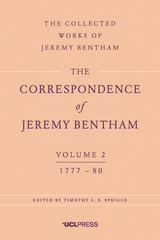
Correspondence of Jeremy Bentham, Volume 2
1777 to 1780
Jeremy Bentham, edited by Timothy L. S. Sprigge, and series edited by J.H. Burns
University College London, 2017
The first five volumes of the Correspondence of Jeremy Bentham contain more than 1,300 letters written to and from Bentham over fifty years, beginning in 1752 at the age of three and ending in 1797 with correspondence concerning his attempts to set up a national plan for the provision of poor relief. The letters in Volume 1 (1752-1776) document his difficult relationship with his father—Bentham lost five infant siblings and his mother—and his increasing attachment to his surviving brother, Samuel. We also see an early glimpse of Bentham’s education, as he committed himself to philosophy and legal reform. The exchanges in Volume 2 (1777-1780) cover a major event: a trip by Samuel to Russia. This volume also reveals Bentham working intensively on the development of a code of penal law, enhancing his reputation as a legal thinker. Volume 3 (1781-1788) shows that despite developing a host of original ideas, Bentham actually published little during this time. Nevertheless, this volume also reveals how the foundations were being laid for the rise of Benthamite utilitarianism. The letters in Volume 4 (1788-1793) coincide with the publication of An Introduction to the Principles of Morals and Legislation, which had little impact at the time. In 1791 he published The Panopticon: or, The Inspection-House, which he proposed the building of a circular penitentiary house. Bentham’s letters unfold against the backdrop of the French Revolution and show that his initial sympathy for France began to turn into hostility. Bentham’s life during the years in Volume 5 (1794-1797) was dominated by the panopticon, both as a prison and as an indigent workhouse. The letters in this volume document in great detail Bentham’s attempt to build a panopticon prison in London, and the opposition he faced from local aristocratic landowners.
[more]
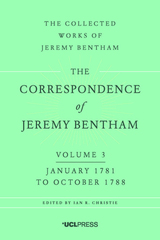
Correspondence of Jeremy Bentham, Volume 3
January 1781 to October 1788
Jeremy Bentham, edited by Ian R. Christie, and series edited by J.H. Burns
University College London, 2017
The first five volumes of the Correspondence of Jeremy Bentham contain more than 1,300 letters written to and from Bentham over fifty years, beginning in 1752 at the age of three and ending in 1797 with correspondence concerning his attempts to set up a national plan for the provision of poor relief. The letters in Volume 1 (1752-1776) document his difficult relationship with his father—Bentham lost five infant siblings and his mother—and his increasing attachment to his surviving brother, Samuel. We also see an early glimpse of Bentham’s education, as he committed himself to philosophy and legal reform. The exchanges in Volume 2 (1777-1780) cover a major event: a trip by Samuel to Russia. This volume also reveals Bentham working intensively on the development of a code of penal law, enhancing his reputation as a legal thinker. Volume 3 (1781-1788) shows that despite developing a host of original ideas, Bentham actually published little during this time. Nevertheless, this volume also reveals how the foundations were being laid for the rise of Benthamite utilitarianism. The letters in Volume 4 (1788-1793) coincide with the publication of An Introduction to the Principles of Morals and Legislation, which had little impact at the time. In 1791 he published The Panopticon: or, The Inspection-House, which he proposed the building of a circular penitentiary house. Bentham’s letters unfold against the backdrop of the French Revolution and show that his initial sympathy for France began to turn into hostility. Bentham’s life during the years in Volume 5 (1794-1797) was dominated by the panopticon, both as a prison and as an indigent workhouse. The letters in this volume document in great detail Bentham’s attempt to build a panopticon prison in London, and the opposition he faced from local aristocratic landowners.
[more]
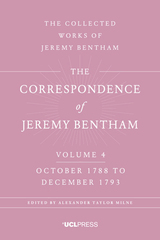
Correspondence of Jeremy Bentham, Volume 4
October 1788 to December 1793
Jeremy Bentham, edited by Alexander Taylor Milne, and general editor John R. Dinwiddy
University College London, 2017
The first five volumes of the Correspondence of Jeremy Bentham contain more than 1,300 letters written to and from Bentham over fifty years, beginning in 1752 at the age of three and ending in 1797 with correspondence concerning his attempts to set up a national plan for the provision of poor relief. The letters in Volume 1 (1752-1776) document his difficult relationship with his father—Bentham lost five infant siblings and his mother—and his increasing attachment to his surviving brother, Samuel. We also see an early glimpse of Bentham’s education, as he committed himself to philosophy and legal reform. The exchanges in Volume 2 (1777-1780) cover a major event: a trip by Samuel to Russia. This volume also reveals Bentham working intensively on the development of a code of penal law, enhancing his reputation as a legal thinker. Volume 3 (1781-1788) shows that despite developing a host of original ideas, Bentham actually published little during this time. Nevertheless, this volume also reveals how the foundations were being laid for the rise of Benthamite utilitarianism. The letters in Volume 4 (1788-1793) coincide with the publication of An Introduction to the Principles of Morals and Legislation, which had little impact at the time. In 1791 he published The Panopticon: or, The Inspection-House, in which he proposed the building of a circular penitentiary house. Bentham’s letters unfold against the backdrop of the French Revolution and show that his initial sympathy for France began to turn into hostility. Bentham’s life during the years in Volume 5 (1794-1797) was dominated by the panopticon, both as a prison and as an indigent workhouse. The letters in this volume document in great detail Bentham’s attempt to build a panopticon prison in London, and the opposition he faced from local aristocratic landowners.
[more]
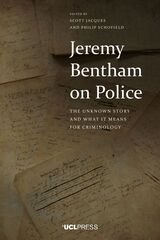
Jeremy Bentham on Police
The Unknown Story and What It Means for Criminology
Edited by Scott Jacques and Philip Schofield
University College London, 2021
Recovering Bentham’s thoughts on policing and what they mean for criminology today.
Jeremy Bentham theorized the panopticon as modern policing emerged across the British Empire, yet while his theoretical writing became canonical in criminology, his perspective on the police remains obscure. Jeremy Bentham on Police recovers the reformer’s writings on policing alongside a series of essays that demonstrate their significance to the past, present, and future of criminology.
Jeremy Bentham theorized the panopticon as modern policing emerged across the British Empire, yet while his theoretical writing became canonical in criminology, his perspective on the police remains obscure. Jeremy Bentham on Police recovers the reformer’s writings on policing alongside a series of essays that demonstrate their significance to the past, present, and future of criminology.
[more]
READERS
Browse our collection.
PUBLISHERS
See BiblioVault's publisher services.
STUDENT SERVICES
Files for college accessibility offices.
UChicago Accessibility Resources
home | accessibility | search | about | contact us
BiblioVault ® 2001 - 2024
The University of Chicago Press









